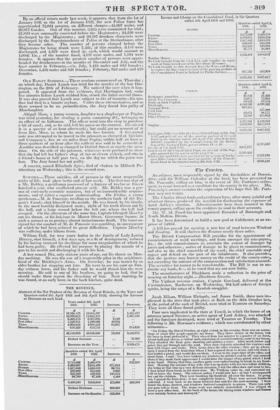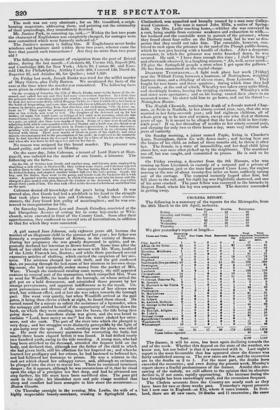Jacob Alilsan, William Richards, and James Smith, three men im-
plicated in the riots that took place at Bath on the 30th October last, at the period of the sack of Bristol, were tried at Taunton on Saturday. They were all three found guilty.
Four men implicated in the riots at Yeovil, in which the house of an attorney named Newman, an active agent of Lord Ashley, was attacked and the furniture destroyed, were tried at Taunton on Tuesday. The following is Mr. Newman's evidence; which was corroborated by other
witnesses- "On Friday the 21st of October, at eight o'clock in the es-cuing, there was an assem- blage of about fifty people opposite my house. They threw stones at the house, but the trees in front protected it. They stayed from ten minutes to a quarter of an hour. About half-past eleven, ft violent mob, consisting of several hundreds, came to my house. They attacked the front gate,- shouting and making a noise. After much labour anti pains, they got through into the yard. They then violently attacked the windows and door with stones and sticks. They broke down the office window ; they got in, where- upon I moved from the front-door where I had required them to desist, and told them had loaded a pistol, and would fire on them. I went to the inner-door of the office, and stood t here. I said, • You have broken my windows, be satisfied and be oft' and assured them if they made their appearance I would draw the trigger of my pistol, which I held in my hand. During that time, another party were endeavouring to break in my front- door. Hearing the screams of my wife, who was up-stairs with her two infant cbildren, she being at that time in a very delicate situation, I lelt the office-door and went to her. I then heard them break in the front-door. Mr. Tenskins came in, and entreated my- wife to leave the house. She refused, unless I iscuild join her : at last I accompanieri her end the children. They were breaking the furniture all over the house. In going out, I passed the front-door ; it was completely broken. There were several hundreds collected. I went back to my house between four and five the next morning. I them found the doors, shutters, and windows battered completely to pieces. There was only' one pane left in front. The frame work was entirely demolished. I was obliged to have a new office-door. At the back of the house, the dining-room windows and frames. were entirely broken and destroyed."
The mob was not very obstinate ; for on Mr. Goodford, a neigh- bouring magistrate, addressing them, and pointing out the criminality of their proceedings, they immediately desisted. Mr. Justice Park, in summing up, said,—" Within the last two years the character of Englishmen was completely changed, for outrages were now committed which were formerly unheard of." The Justice's memory is failing him. If Englishmen never broke windows and furniture until within these two years, whence came the laws that punish such transactions ? Are they no more than two years old ?
The following is the amount of emigration from the port of Bristol alone, during the last month—Caledonia 60, Cosmo 105, Superb 200, and Cambridge 200, for New York ; Alicia 70, Canton 30, and Eme- rald 130, for Philadelphia; Airthry Castle 200, Concord 150, David 50, Superior 37, and Ariadne 66, for Quebec ; total 1,358.
On Friday last week, Joseph Dunks was tried for the wilful murder of Mary Green, alias Polly Button. We mentioned the facts of the case at the time when the murder was committed. The following facts were given in evidence at the trial.
On the evening of Saturday the 17th of March. Drinks came to the house of the de- ceased, and calkd her out, and they had some conversation together. In a little time the prisoner threw something against the window, as a signal for her to go out to Into ; he took her across some fields, called Burgage Fields, to a hovel which Gel had been in the habit, of frequenting, and some time afterwards two neighbours heard the voice of a woman in distress proceeding from that diristion, and exclaiming, "Olt, oh, loose me, loose me !" That night the prisoner, who was a married man, returned home about nine Or ten o'clock, and went to bed. The daughter or the deceased sat up for her mother all night, but could learn no tidings of her until next morning, when she was carried home a corpse. Blood was traced from the hovel for a distance of several yards. to a gate, on which also there were marks of blood. Prints of a shoe were tband in an adjoining field, which corresponded with that of flanks, and a knife was also [must near the place, similar to one previonsly seen in Banks's possession ; a button also corres- ponding with 111050 On the prisoner's waistcoat, was discovered in an adjoining field, covered with blood. There were marks of blood on parts of his clothes; and other minute circumstances led to the presumption of his guilt ; he confessed to the constable that he had knocked down the ■ke0aSed in the hut by a blow of his list on the temple, and when she was down he fell upon her and cut her throat.
No reason was assigned for this brutal murder. The prisoner was found guilty, and executed on Monday.
On the same day, John Coleman, a tenant of Lord Bute's at Shot- tiswell, was indicted for the murder of one Goode, a labourer. The following are the facts— On the 8th of October last, Goode and another man, and his son, were employed in thatchink a rick of hay at Shottiswell ; they wished some water, and Coleman objected to allow them to take water from his pump. The boy having filled a bucket of water, he kicked it down, an,l emptied another bucket full over the lad's person. Goode, the boy, and his father, then went to the pump, and Goode took the bucket to till it with water. A quarrel was the consequence, in which Coleman went into his honse and dis- charged a gun, loaded with shot, through the window at the deceased, who was within about three yards of him. The shut took effect in the deceased's forehead, and killed him on the spot.
Coleman denied all knowledge of the gun's being loaded. It was proved also, that Goode had had a pitchfork in his hand in the struggle that took place between him, and Coleman. Linder these circum- stances, the Jury found him' guilty of manslaughter; and he was sen- tenced to transportation for life.
On Saturday last, James Lea and Joseph Grindley, convicted at the last Shropshire Assizes of setting lire to some hay-stacks at Whit- church, were executed in front of the County Gaol. Soon after their apprehension, they confessed to several acts of incendiarism, in addition to that for which they were convicted.



























 Previous page
Previous page